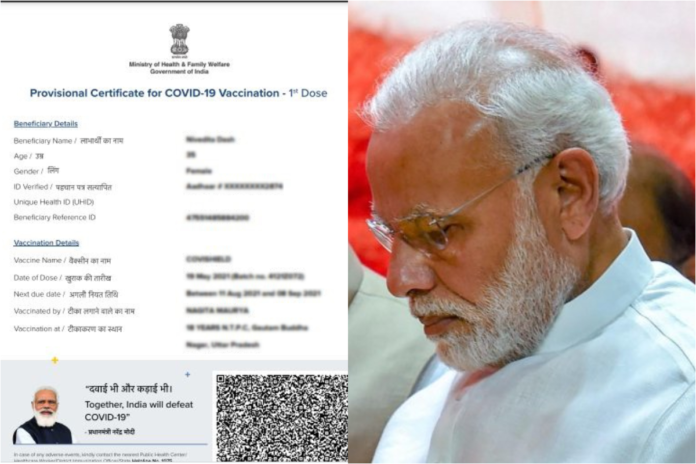The decision to remove Prime Minister Narendra Modi’s photograph from COVID-19 vaccination certificates generated widespread attention and sparked debate across the country. The CoWIN platform, which has been instrumental in India’s vaccination drive, initially featured the Prime Minister’s image on vaccination certificates issued to beneficiaries. However, the sudden absence of his photo on these certificates has raised questions about the rationale behind this decision and its implications.
The CoWIN platform, launched by the Indian government to streamline the vaccination process, initially included Prime Minister Modi’s photograph on vaccination certificates as a symbolic gesture to underscore the government’s commitment to the vaccination drive. The inclusion of the Prime Minister’s image was seen as a means to instill confidence among the populace and reinforce the importance of vaccination in the fight against the COVID-19 pandemic.
However, the recent removal of Prime Minister Modi’s photograph from vaccination certificates has prompted speculation and conjecture regarding the motives behind this decision. While some view it as a pragmatic step to depoliticize the vaccination process and focus solely on public health objectives, others perceive it as a politically motivated move aimed at distancing the vaccination drive from individual personalities.
Health Ministry officials responded to the controversy, asserting that the decision to remove the Prime Minister’s photograph from vaccination certificates was taken to streamline the process and ensure uniformity in the documentation across all states and union territories. According to officials, the inclusion of the Prime Minister’s photograph was initially intended as a symbolic gesture to kickstart the vaccination campaign but was not sustainable in the long run due to logistical challenges and variations in implementation at the state level.
Furthermore, health officials emphasized that the focus should remain on the substantive aspects of the vaccination drive, such as ensuring equitable access to vaccines, addressing vaccine hesitancy, and bolstering healthcare infrastructure to support mass vaccination efforts. They reiterated the government’s commitment to achieving universal vaccination coverage and urged citizens to continue to avail themselves of the vaccine as per the prescribed guidelines.
The removal of Prime Minister Modi’s photograph from vaccination certificates also underscores the evolving dynamics of India’s vaccination strategy as it transitions from the initial phase of mass inoculation drives to a more targeted approach focusing on specific demographics, geographic areas, and high-risk populations. As vaccination coverage expands and supply constraints ease, the emphasis shifts towards reaching underserved communities, addressing vaccine hesitancy, and strengthening vaccine delivery mechanisms.
Moreover, the controversy surrounding the Prime Minister’s photograph on vaccination certificates highlights the broader issue of politicization in public health initiatives. While the inclusion of political leaders’ images may serve as a motivational tool to mobilize public support initially, it also runs the risk of politicizing essential healthcare interventions and undermining public trust in the integrity and impartiality of the vaccination process.
In light of the recent developments, health authorities stress the importance of maintaining transparency and accountability in the vaccination drive, ensuring that decisions are guided by scientific evidence, public health considerations, and the best interests of the population. They urge stakeholders to prioritize collaboration and cooperation in combating the COVID-19 pandemic, transcending political differences and individual agendas for the collective welfare of society.
Looking ahead, the focus remains on accelerating the pace of vaccination, expanding coverage to remote and vulnerable populations, and adapting strategies to address emerging challenges such as vaccine hesitancy, misinformation, and supply chain disruptions. As India navigates the complexities of its vaccination rollout, the emphasis must remain on solidarity, resilience, and a shared commitment to overcoming the COVID-19 crisis.
In addition, while the removal of Prime Minister Modi’s photograph from vaccination certificates may have stirred controversy, it underscores the imperative of prioritizing public health objectives over political symbolism. Health Ministry officials have responded to the issue, emphasizing the need for uniformity and efficiency in the vaccination documentation process. As India continues its battle against COVID-19, concerted efforts are required to ensure equitable vaccine access, build public trust, and mitigate the impact of the pandemic on society.

